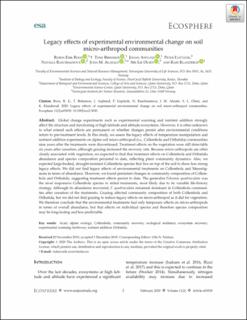| dc.description.abstract | Global change experiments such as experimental warming and nutrient addition strongly affect the structure and functioning of high latitude and altitude ecosystems. However, it is often unknown to what extend such effects are permanent or whether changes persist after environmental conditions return to pre-treatment levels. In this study, we assess the legacy effects of temperature manipulation and nutrient addition experiments on alpine soil micro-arthropod (i.e., Collembola and Oribatida) communities nine years after the treatments were discontinued. Treatment effects on the vegetation were still detectable six years after cessation, although grazing increased the recovery rate. Because micro-arthropods are often closely associated with vegetation, we expected to find that treatment effects on Collembola and Oribatida abundance and species composition persisted to date, reflecting plant community dynamics. Also, we expected large-bodied, drought-resistant Collembola species that live on top of the soil to show less strong legacy effects. We did not find legacy effects of environmental treatments on Collembola and Mesostigmata in terms of abundance. However, we found persistent changes in community composition of Collembola and Oribatida, suggesting treatment effects persist to date. The generalist Folsomia quadrioculata was the most responsive Collembola species to initial treatments, most likely due to its variable life-history strategy. Although its abundance recovered, F. quadrioculata remained dominant in Collembola communities after cessation of the treatments. Grazing affected community composition of both Collembola and Oribatida, but we did not find grazing to reduce legacy effects on micro-arthropod as it did for vegetation. We therefore conclude that the environmental treatments had only temporary effects on micro-arthropods in terms of overall abundance, but that effects on individual species and therefore species composition may be long-lasting and less predictable. Acari; alpine ecology; Collembola; community recovery; ecological resilience; ecosystem recovery; experimental warming; herbivory; nutrient addition; Oribatida. | |
